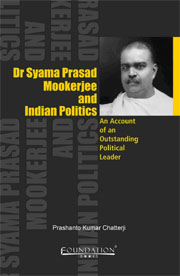Book contents
- Frontmatter
- Contents
- Preface
- 1 Dr Syama Prasad Mookerjee as the Finance Minister of Bengal, 1941–1942
- 2 Syama Prasad and Hindu Mahasabha's Ascendancy in Indian Politics, 1938–1944
- 3 Syama Prasad and Hindu Mahasabha's Transitory Resuscitation after Reverses, 1945–1947
- 4 Syama Prasad's Achievements as the Central Cabinet Minister, 1947–1950
- 5 Syama Prasad and Establishment of Bharatiya Jana Sangh, 1950–1953
- 6 Conclusion
- Appendix I
- Appendix II
- Appendix III
- Appendix IV
- Appendix V
- Appendix VI
- Appendix VII
- Bibliography
- Index
3 - Syama Prasad and Hindu Mahasabha's Transitory Resuscitation after Reverses, 1945–1947
Published online by Cambridge University Press: 05 February 2012
- Frontmatter
- Contents
- Preface
- 1 Dr Syama Prasad Mookerjee as the Finance Minister of Bengal, 1941–1942
- 2 Syama Prasad and Hindu Mahasabha's Ascendancy in Indian Politics, 1938–1944
- 3 Syama Prasad and Hindu Mahasabha's Transitory Resuscitation after Reverses, 1945–1947
- 4 Syama Prasad's Achievements as the Central Cabinet Minister, 1947–1950
- 5 Syama Prasad and Establishment of Bharatiya Jana Sangh, 1950–1953
- 6 Conclusion
- Appendix I
- Appendix II
- Appendix III
- Appendix IV
- Appendix V
- Appendix VI
- Appendix VII
- Bibliography
- Index
Summary
SECTION-1: Setbacks for Hindu Mahasabha, 1945–1946
As the war was coming to a close, attempts began to be made in different quarters for a solution of the political problem. After the failure of the Gandhi–Jinnah talks, two other outstanding events leading towards some sort of settlement had taken place from the non-official side. First, on 9 November 1944, Gandhi readily offered to cooperate with a committee, that Sir Tej Bahadur Sapru had for long opined should be appointed to investigate the entire constitutional and communal problem. Sapru then persuaded the Standing Committee of the Non-Party Conference to appoint a Committee under his chairmanship. The Sapru Committee, which Dr Mookerjee correctly believed was the outcome of Gandhiji's inspiration, met in Delhi on 29 December and dispersed on 31 December. It came with an interim report unanimously recommending the acceptance of parity between Caste Hindus and Muslims in the formation of an Interim National Government, subject to the condition that the Muslims must agree to a joint electorate. It is evident from Chairman Sapru's letter dated 7 January 1945 that while the Sikh attitude was quite helpful and he was expecting response from Hindus, Jinnah refused to recognise them. He also noted that while the view of the Hindus, shared by many minorities, favoured a strong Centre, the Muslim League view was that there should be no Centre of any kind. Wavell did not really expect anything to come of the Sapru Committee whose report was sent to him in April 1945 while he was in London.
- Type
- Chapter
- Information
- Dr Syama Prasad Mookerjee and Indian PoliticsAn Account of an Outstanding Political Leader, pp. 149 - 213Publisher: Foundation BooksPrint publication year: 2010

